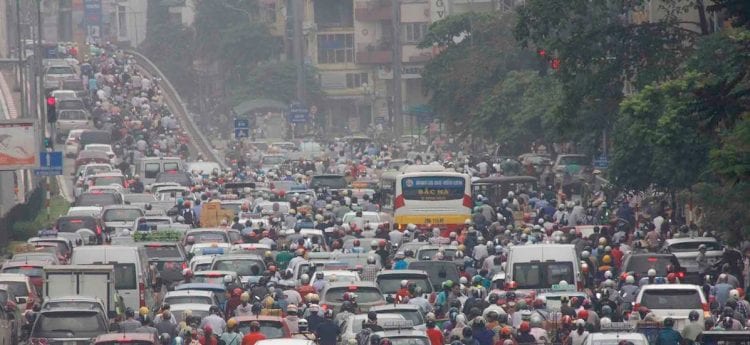On Thursday, Hanoi’s Department of Natural Resources and Environment convened a conference to strategize on air quality control and to urge collective action against the city’s deteriorating air conditions.
The department’s statistics indicate significant environmental strides: over 99% of charcoal stoves have been phased out, straw burning in outlying districts has been cut by 80%, numerous brick kilns have been dismantled, and daily waste collection and landfill disposal exceed 90%.
Hanoi is piloting a program to gauge motorcycle emissions, seeking impactful remedies for air contamination.
Nonetheless, air pollution persists as a critical concern in Hanoi, with monitoring stations reporting substandard air quality for more than a third of the year, translating to approximately 110 days of poor air conditions annually.
 Concern about air quality can even be a lucrative business opportunity.
Concern about air quality can even be a lucrative business opportunity.
The city’s average PM2.5 levels—fine particulate matter with a diameter of 2.5 micrometers or less—nearly double the national safety threshold. Such particulates, which also include larger PM10 particles, are linked to severe health issues like respiratory disorders, asthma, and cancer, posing heightened risks to vulnerable groups like children, expectant mothers, and the elderly.
Transportation remains the leading contributor to PM2.5 pollution, followed by industrial discharge, agricultural practices, and everyday human activities.
At the seminar, Nguyen Huong Hue of the French Development Agency highlighted their joint initiative with Hanoi to enhance air quality. Hue advocated for increased public transportation usage to curtail emissions.
Do Quang Huy of the Vietnam Association of Motorcycle Manufacturers emphasized VAMM’s dedication to developing greener motorcycles and recommended routine maintenance to mitigate emissions. VAMM has also initiated a project to evaluate older vehicles for emission control.
Earlier in March, Hanoi’s authorities approved an air quality management strategy, aiming to reduce air pollution and ensure air quality remains satisfactory for at least 75% of the year by 2030.
Related
Source: Vietnam Insider

